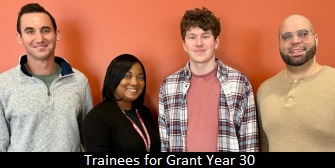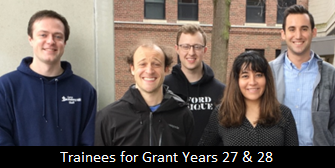Training in Environmental Health Biostatistics
Training in Environmental Health Biostatistics
 Our T32 training grant “Training in Environmental Health Biostatistics” (T32ES007271) is funded by the National Institute of Environmental Health Sciences at NIH.
Our T32 training grant “Training in Environmental Health Biostatistics” (T32ES007271) is funded by the National Institute of Environmental Health Sciences at NIH.
The grant was first awarded in 1992, and was successfully led by Dr. David Oakes for 20 years. The current Director, Dr. Sally W. Thurston, has led this grant since 2015. Dr. Matthew McCall became the Associate Director in 2022.
The overall goal of this program is to prepare trainees for research careers in biostatistics with application to environmental health by providing them with strong statistical skills, while deeply embedding them in Environmental Health Science (EHS) research in a supportive and interactive environment. Training in advanced statistics, epidemiology, and environmental health is achieved through graduate-level course offerings.
The skills of reproducible research, effective communication, collaboration, critical thinking, statistical analysis, and adaptability have been essential in my career development and success."
- Former trainee
Trainees are deeply involved in collaborative EHS research under co-mentorship of a Biostatistics and an EHS faculty trainer, while receiving additional training in reproducible research and improved communication skills. These collaborative research projects give the trainees opportunities to learn about and work on real problems in environmental health, provide needed statistical help under co-mentorship, and be a co-author on the resulting manuscript. Initial projects, which are generally of an applied nature, may lead to PhD thesis research, although this is not a requirement of T32 support. EHS training is augmented with specialized T32 informal seminars and lab tours in a supportive environment that promotes trainee interactions.
T32 trainers include Drs. Thurston, McCall, Brent Johnson, Tanzy Love, Michael McDermott, and Rob Strawderman from Biostatistics, and Drs. Emily Barrett from Rutgers (formerly from OB/GYN and Public Health Science in Rochester), Deborah Cory-Slechta, Marissa Sobolewski, and Martha Susiarjo from Environmental Medicine, and Drs. Elaine Hill, David Rich, Todd Jusko, and Edwin van Wijngaarden from Public Health Sciences.

The most memorable experience from my T32 training is the opportunity for a biostatistics and computational biology PhD student to step into a real lab for the first time through the training program. This allowed me to make real connection of the data that I was working with and the experiment that had generated the data for the first time. It was a very unique experience."
– T32 trainee